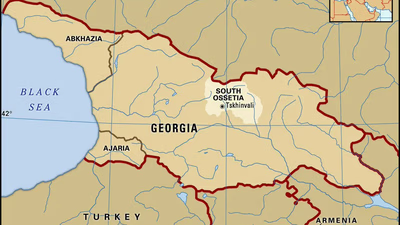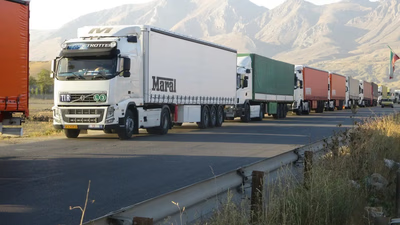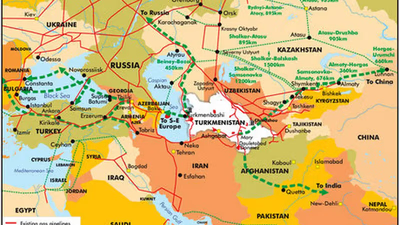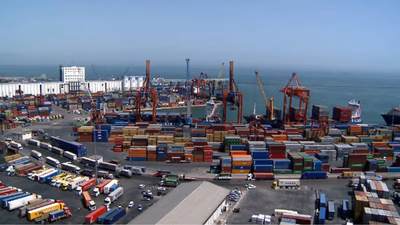
Georgia: A key player in Middle East trade and logistics.
Georgia's strategic location at the crossroads of Europe and Asia provides a gateway for trade between these regions. It serves as a bridge connecting Europe, the Middle East, and Central Asia. This advantageous position allows for easier access to large markets and trade routes, making Georgia an attractive trading hub. Georgia has established preferential trade agreements with various countries and regional blocs, offering favorable trading conditions. For instance, it has a Free Trade Agreement with the European Union (EU) and a Deep and Comprehensive Free Trade Agreement (DCFTA) that provides access to the EU market. Additionally, Georgia is a member of the World Trade Organization (WTO), further facilitating trade relations.
Georgia provides access to emerging markets in the Caucasus, Central Asia, and the Caspian Sea region. As these markets continue to develop and open up, there are opportunities for businesses to expand their customer base and explore new trade partnerships. Georgia's proximity to these markets can be advantageous for companies seeking to establish a foothold in these growing economies. The Georgian government has implemented various reforms to create a business-friendly environment. These reforms aim to reduce bureaucracy, enhance transparency, and simplify procedures for starting and operating businesses. The country has made significant progress in improving its ease of doing business rankings, attracting foreign investment and fostering a favorable trade environment.
Georgia's position on the road to Europe and its strategic situation and tax laws in the field of foreign investment, as well as allowing the return of investor profits abroad are some of the issues that can be raised in this regard. Studies show that strengthening trade relations between the two countries and removing some international barriers to exports and imports to these two countries can strengthen their economies and provide a good platform for sending goods to both countries. Provide.
Given that imports from this country posed many problems for Iranian businessmen and traders at the time of the sanctions, such as the lack of an account and the lack of money transfers from Georgia to Iran, with the formation of Iran's nuclear deal with the European Union and the world, the platforms for importing from Georgia to Iran and exporting to this country became easier. The Guide to Trade Laws on Imports from Georgia to Iran and Exports to Georgia is contained in Resolution 35 of the Cabinet of Ministers of the Republic of Georgia, adopted on January 23, 1995. The decree sets out the ministries and policy-making bodies responsible for importing and exporting to Georgia, the list of licensed and illegal goods, and the export and import goods that must be licensed.
Customs regulations, taxes and duties related to Iran and the export of goods are not prohibited, but tax exemptions are provided for imports from Georgia to Iran for the import of medicine, medical equipment, chemicals and food products. Production of industrial goods such as electric motors, agricultural equipment, artificial textiles, Chinese products, industry, and machinery increased in 1993. But due to the lack of updating in the field of production of these types of industries, the recession in their field in the economy became more and more.
Imports of goods from Georgia to Iran include the limited items mentioned above. However, the economic context of the relations between the two countries has a much higher capacity that needs to be planned. Understanding the economic context of this type of relationship can strengthen Iran's exports to Georgia.
Exports to Georgia; The total volume of trade between Iran and Georgia per year is estimated at about $ 150 million, which is a small figure, and it is clear from these statistics that Iran is not one of Georgia's trading partners, the main reason being the lack of a strong organization and it is organized like the Iran-Georgia Chamber of Commerce and as a result, Iranian businessmen are not familiar with Georgian goods and import and export conditions, as well as Georgians are not familiar with Iranian products.
Georgia has implemented simplified customs procedures and relatively low import and export tariffs. This helps reduce trade barriers and transaction costs, making it easier and more cost-effective for businesses to import and export goods. The streamlined customs processes contribute to quicker clearance times and smoother trade operations. Georgia has been investing in developing its transportation and logistics infrastructure. This includes modernizing ports, building new highways, and improving rail connections. The development of the East-West Highway and the Baku-Tbilisi-Kars railway has enhanced connectivity and facilitated the movement of goods across the region. The Anaklia Deep Sea Port, once completed, is expected to further boost Georgia's logistics capabilities.
-

Georgia"s strategic location at the crossroads of Europe and Asia positions it as a vital trade hub, facilitating access to large markets in the Middle East and Central Asia. The country has established preferential trade agreements, including a Free Trade Agreement with the EU, enhancing its attractiveness for businesses. Georgia"s membership in the WTO further supports its trade relations. The government has implemented reforms to create a business-friendly environment, reducing bureaucracy and improving transparency, which has led to increased foreign investment. The proximity to emerging markets offers opportunities for companies looking to expand their customer base. Recent developments, such as the easing of trade barriers between Iran and Georgia following international agreements, have opened new avenues for import-export activities. Despite challenges faced by Iranian traders in the past, including financial transaction issues, recent changes have simplified customs procedures and reduced tariffs. This has made it easier for businesses to engage in cross-border trade.
Georgia"s ongoing investments in transportation infrastructure, including modernized ports and highways, are expected to enhance logistics capabilities further. Overall, Georgia presents significant opportunities for B2B marketplace activities and commodity trade within the region. "
-

Georgia"s strategic location at the crossroads of Europe and Asia significantly influences its population dynamics and economic activities. The country"s diverse geography, characterized by mountains, valleys, and coastal areas, affects settlement patterns and infrastructure development. With a total land area of approximately 69,700 square kilometers and a population of around 3. 7 million, Georgia exhibits low population density overall, with about 45% residing in the capital city, Tbilisi. This urban concentration leads to higher population density in the capital compared to rural areas. Tbilisi"s historical significance as part of the Silk Road enhances its role in trade and cultural exchange. The geographical features also impact access to resources and transportation networks, shaping migration patterns and socio-economic development. As Georgia seeks recognition from the European Union, its geopolitical position continues to facilitate trade routes and cultural interactions with neighboring countries such as Turkey, Armenia, Azerbaijan, and Russia.
Understanding these dynamics is crucial for businesses looking to engage in trade within the region. "
-

Georgia"s linguistic landscape is dominated by the Georgian language, which is integral to its national identity and governance. The country also hosts a variety of languages, including Russian and Armenian, reflecting its cultural diversity. Eastern Orthodox Christianity is the predominant religion, influencing social dynamics and political discourse. Georgia"s economy has evolved since its independence in 1991, focusing on market-oriented reforms that attract foreign investment in sectors like agriculture and tourism. Despite these advancements, challenges such as high unemployment (13. 6%) and poverty (31%) persist. The political framework is a parliamentary republic with a multi-party system, where economic policies are shaped by political developments. Georgia"s trade includes imports of fuel and machinery from countries like Russia and Turkey, while exports feature products such as mineral water and fruits to various international markets. Understanding these dynamics is crucial for businesses looking to engage in the region"s trade opportunities.
-

Georgia has streamlined its customs procedures to enhance trade efficiency, reducing bureaucratic hurdles for importers and exporters. Customs declarations are mandatory, detailing the nature and value of goods. The country adheres to WTO customs valuation principles for determining the customs value, which is essential for calculating duties and taxes. Certain goods may be exempt from export duties, while others, particularly natural resources and specific agricultural products, may incur restrictions or tariffs. Import duties vary by product category; for instance, cosmetics and certain food items have a 5% duty, while others like honey and dairy products face a 12% duty. Documentation such as commercial invoices and packing lists is required for customs clearance. Georgia"s tariff structure is relatively low, with ongoing reductions to attract foreign investment. The country has established preferential trade agreements that offer reduced or zero tariffs on specific goods traded with EU member states.
For detailed information on customs laws and export tariffs, businesses can consult the Revenue Service of Georgia or the Ministry of Economy and Sustainable Development. "
-

Georgia"s economy heavily relies on imports, particularly energy resources like natural gas and oil products, alongside machinery and industrial goods essential for various sectors including agriculture and construction. The country also imports consumer goods such as electronics, clothing, and food products to meet domestic demand. Notably, the automotive sector sees significant imports of vehicles and parts. Georgia"s exports include agricultural products like wine and nuts, as well as minerals such as copper and gold. Despite challenges in trade relations with Iran, there is potential for increased exports from Iran to Georgia. The establishment of a company in Georgia"s free trade zones can streamline import-export processes. Economic reforms over the past decade have bolstered Georgia"s trade attractiveness, with foreign trade reaching $826. 8 million in January 2019 alone.
Key trading partners include the EU, Turkey, Russia, and neighboring Caucasus countries. The Deep and Comprehensive Free Trade Agreement (DCFTA) with the EU has enhanced market access for Georgian goods.
-

Georgia presents diverse trade opportunities across various sectors, including agriculture, tourism, manufacturing, and energy. The agricultural sector is notable for its high-quality products like wine and nuts, with potential for modernization and export growth. The tourism industry is thriving, particularly in Tbilisi and Batumi, creating demand for hospitality services. Manufacturing benefits from Georgia"s strategic location and low labor costs, with industries such as textiles and automotive components showing promise. The construction sector is also expanding due to urban development needs. Despite challenges in advertising costs exceeding production expenses, the free economic system encourages business ventures. Trade relations with Iran are evolving, focusing on goods like meat and wood products. Additionally, Georgia"s energy sector offers investment opportunities in hydroelectric power and renewables. The IT industry is rapidly growing, supported by government initiatives aimed at fostering innovation through technology parks and incubators.
-

Imports from Georgia to Iran are primarily focused on specific products, notably meat, beech wood, ferro-manganese, and machinery. The total value of imports from Georgia to Iran is approximately $40 million. Despite the potential for increased trade, economic exchanges are hindered by a lack of awareness among economic delegations regarding investment opportunities. Recent agreements between Tehran and Tbilisi aim to eliminate taxes and enhance transport investments. Iran views Georgia as a strategic alternative route for cargo transport to Europe. Current imports include various goods such as tractors, metalworking machines, and cars, with the latter being attractive due to lower prices in Georgia compared to Iran. However, importing cars requires compliance with legal procedures. Goods imported from Georgia fall into three categories: authorized goods that do not require licenses, conditional goods needing licenses (like wheat), and prohibited goods under Islamic law (such as alcohol).
The importation of live cattle has also gained traction due to local production in Georgia. Quality assurance is crucial when importing industrial goods; thus, it is recommended to source products from reputable manufacturers. Additionally, Georgia"s political stability enhances its appeal for traders engaged in import-export activities. "







